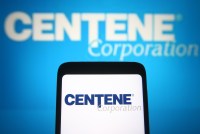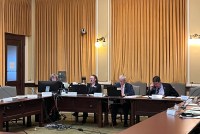Latest Morning Briefing Stories
One State Looks to Get Kids in Crisis out of the ER — And Back Home
At many U.S. hospitals, children and teens are stuck in the emergency department for days or weeks because psychiatric beds are full. Massachusetts is trying a simple, promising solution.
In California, Democrats Propose $25 Minimum Wage for Health Workers
State Sen. María Elena Durazo and Service Employees International Union-United Healthcare Workers West want to give health facility support staffers a raise. Hospitals, nursing homes, and dialysis clinics are expected to resist.
California: proponen salario mínimo de $25 para trabajadores de salud
Si los legisladores aprueban el proyecto de ley y el gobernador Gavin Newsom lo firma, un líder sindical estimó que 1.5 millones de trabajadores de California podrían obtener un aumento salarial en enero de 2024.
Doctors Are Disappearing From Emergency Rooms as Hospitals Look to Cut Costs
As a money-saving strategy, emergency rooms are turning to nurse practitioners, physician assistants, and other staffers who earn far less than physicians.
Montana Considers Allowing Physician Assistants to Practice Independently
The bill, modeled on laws in North Dakota and Wyoming, is opposed by doctors who say it would let physician assistants practice outside the scope of their training.
Community Resurrects Colorado Birth Center Closed by Private Equity Firm
A private equity firm bought a birth center and then shut it down. The community brought it back as a nonprofit.
Centene Agrees to $215 Million Settlement With California for Alleged Medicaid Overbilling
The nation’s largest Medicaid insurer denies wrongdoing after the California attorney general’s office investigated it for inflating prescription drug costs.
‘We Ain’t Gonna Get It’: Why Bernie Sanders Says His ‘Medicare for All’ Dream Must Wait
As he takes the reins of the Senate Health, Education, Labor & Pensions Committee, the independent from Vermont and implacable champion of “Medicare for All” maps out his strategy for negotiating with Republicans — and Big Pharma.
Decisions by CVS and Optum Panicked Thousands of Their Sickest Patients
Pharmacy closures by two of the biggest home infusion companies point to grave shortages and dangers for patients who require IV nutrition to survive.
Por un tecnicismo, niños necesitados podrían no tener acceso a vacunas contra el VRS
El virus respiratorio sincitial afecta a bebés de todas las clases sociales, pero tiende a perjudicar más a los hogares pobres y hacinados
A Technicality Could Keep RSV Shots From Kids in Need
The Vaccines for Children program, which buys more than half the pediatric vaccines in the U.S., may not cover the RSV shot for babies because it’s not technically a vaccine.
Millones en riesgo de perder Medicaid, mientras terminan protecciones por la pandemia
Los estados se están preparando para remover a millones de personas de Medicaid, a medida que expiran las protecciones que se implementaron al comienzo de la pandemia de covid-19.
As Pandemic-Era Medicaid Provisions Lapse, Millions Approach a Coverage Cliff
States are trying to reach millions of Medicaid enrollees to make sure those still eligible remain covered and help others find new health insurance.
Nursing Home Owners Drained Cash During Pandemic While Residents Deteriorated
As the federal government debates whether to require higher staffing levels at nursing homes, financial records show owners routinely push profits to sister companies while residents are neglected. “A dog would get better care than he did,” one resident’s wife said.
Some Addiction Treatment Centers Turn Big Profits by Scaling Back Care
Private equity groups are cashing in on rising rates of alcohol and drug addiction in the U.S. But they aren’t necessarily investing in centers with the best treatment standards, and they often cut extra services.
Government Lets Health Plans That Ripped Off Medicare Keep the Money
In a surprise decision, U.S. officials yield to insurance industry demands — at least for now.
Montana Pharmacists May Get More Power to Prescribe
Supporters of a proposed law say it would fill a health provider gap in rural areas, while doctors worry it will give pharmacists power outside the scope of their education.
As States Seek to Limit Abortions, Montana Wants to Redefine What Is Medically Necessary
Montana officials are looking to tighten rules around medically necessary abortions for those who use Medicaid as their health insurance. Reproductive health advocates and Democratic lawmakers have said the move is part of a broader agenda to whittle away access to the procedure.
Luring Out-of-State Professionals Is Just the First Step in Solving Montana’s Health Worker Shortage
Two proposals would make it easier for professionals with out-of-state licenses to work in Montana, but that tactic likely won’t be enough to fill the demand for mental health providers.
The debt ceiling crisis facing Washington puts Medicare and other popular entitlement programs squarely on the negotiating table this year as newly empowered Republicans demand spending cuts. Meanwhile, as more Americans than ever have health insurance, the nation’s health care workforce is straining under the load. Joanne Kenen of the Johns Hopkins Bloomberg School of Public Health and Politico, Tami Luhby of CNN, and Victoria Knight of Axios join KHN’s chief Washington correspondent Julie Rovner to discuss these topics and more. Plus, for extra credit, the panelists recommend their favorite health policy stories of the week they think you should read, too.























